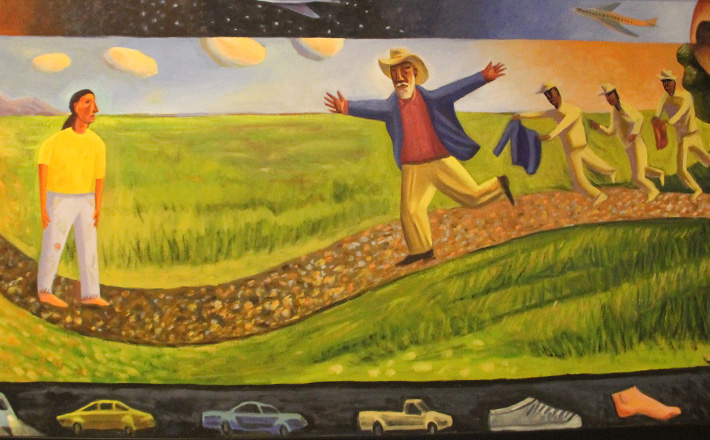Commentary on 2 Corinthians 5:16-21
As I read through this passage, I am struck by how many of the verses have been pulled out of context for use as catchy ‘one liners’:
“If anyone is in Christ, there is a new creation”; “. . .in Christ, God was reconciling the world to God’s self”; “We are ambassadors for Christ.” The up-beat nature of these individual verses belies the tense relationship between Paul and the Corinthians at the time of this correspondence. When we place them back in context, we get a glimpse into some of the ways theology and life come together.
The Situation
At the time Paul writes 2 Corinthians, he apparently felt that he was being viewed from a “human point of view.” One issue that emerges later in the letter is his standing as an apostle: he just does not have the powerful presence and demeanor that the Corinthians expect (chapters 10-11). They are frustrated also because Paul says he is going to visit, and then he doesn’t come; thus Paul appears to be a man who does not keep his word (1:15-2:4). In the ancient world (and no less so today), a person’s character is revealed by what they say and what they do. The Corinthians are trying to match Paul’s status as an apostle with their experience of the man and finding it difficult.
Paul, on the other hand, views the Corinthians as his very own. He is pained that they are drawn to apostles other than him, and he desperately desires to achieve reconciliation with the community. Five times in three verses he introduces the word “reconciliation.” A careful reading of the first two verses (18-19) reveals that Paul is driving home a point by having the one verse simply repeat what is said in the other: namely that God, through Christ, reconciles the world to God’s self, and that God has entrusted the ministry and message of reconciliation to Paul. Paul repeats this final point one more time in verse 20 when he asserts that “We are ambassadors for Christ, since God is making his appeal through us.” This leaves the Corinthians in no doubt that Paul sees himself as speaking for God; this is, after all, what ambassadors do. Therefore, Paul goes on to urge the Corinthians, be reconciled to God. Yet one wonders if what Paul really means to say is “be reconciled to me.”
The Theology
Paul’s appeal for reconciliation arises out of a complex, messy human situation. Much as he desires the Corinthians to be reconciled to God (and it is not wholly clear in what ways he thinks they are not), Paul also earnestly yearns for some kind of reconciliation between the Corinthians and him. I doubt that Paul thinks of these as two separate issues. Rather, I suspect Paul recognizes that what goes on in human communities, how we relate to one another, has implications for how we relate to God. It is not just about us; nor is it just about God. It is about how we understand ourselves to be in relationship with God and with one another, all in the same moment. The two are inextricably linked.
To illustrate this, Paul juxtaposes two ways of viewing one another, using the example of the Christ. At one time, he says, we looked at the one we call the Christ and saw, well, nothing special: perhaps a prophet, perhaps a fool. We judged on the basis of our human experience (what Paul calls “a human point of view”). Then something happened: something that allowed us to see in Christ the one in and through whom God reconciles the world to God’s self. Paul does not specify what this “something is” and it is very likely different for each of us. However, the affect is that we experience the presence of God not only in our own lives, but come to recognize the presence of God permeating the entire cosmos. Our way of seeing has changed, as well as our understanding of how we are in the world.
Paul goes on to say that “if anyone is in Christ, there is a new creation” (verse 17). I am inclined to leave out the “a” and simply say “new creation” because this more nearly renders the idea that the creation is ongoing, reflected by Paul’s use of the perfect tense in the phrase “become new.” Ongoing, here, does not mean in the sense of evolution, but in the sense that creation, when it is sustained as we are in Christ, is in a constant state of renewal. This on-going act of creation, says Paul, occurs through Christ who restores the tear in the relationship between the Creator and creation. “In Christ” we experience God reaching out to us and ourselves as creation restored.
If we recognize ourselves as a part of this new creation, then we no longer view one another in the same way. Our vision has changed. Reconciliation is not simply something to be desired; it becomes an imperative because we have experienced reconciliation with the one who has given us (new) life. If, in this most important of all relationships, we find that our “trespasses” (which can also be rendered “missteps”) are not held against us, we too are challenged to reach across the boundaries and barriers that separate us, whether due to missteps, misunderstandings, or misconceptions, and find ways to renew our relationships as a part of the on-going act of creation.
When Life and Theology Meet
Were Paul and the Corinthians reconciled? We do not know. The danger remains that one or the other side will confuse their status as ambassadors with the role of God, and reconciliation with conformity. As it stands, we are only left with the issues and the possibilities. Much as I like tidy endings, I am drawn to the open-endedness of this situation because it gives us room to consider what we might do in this, or any other, situation where we are still searching for the reconciliation that will open up the potential for the renewal of creation. It is in this act, says Paul, that we may become the righteousness of God.


March 14, 2010